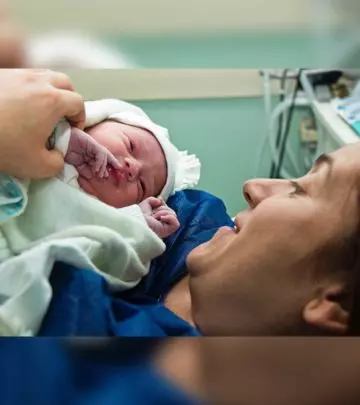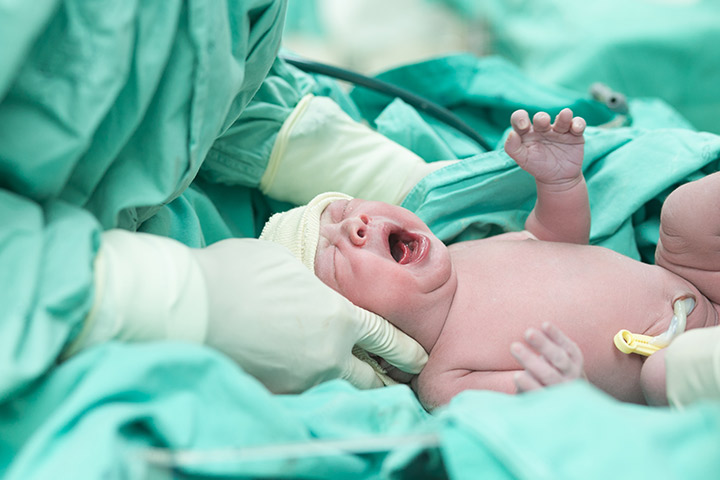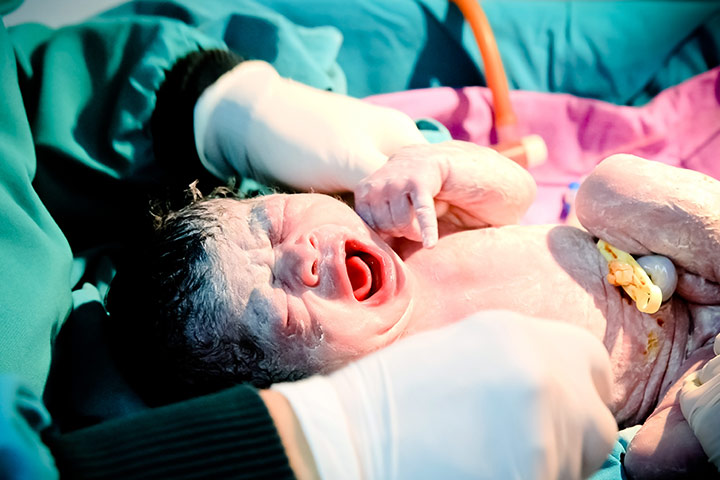
Image: Shutterstock
One of the major concerns of a mother, who’s due to undergo delivery soon, is whether she can hold back her bowel movement when it’s time for the baby to come out. That is why many pregnant women go to great lengths to ‘clean’ their bowels. From using magnesium, eating a fiber-rich diet to trying natural laxatives, expecting mothers give a shot to almost everything that could help them through. But the truth is, try as much as we can, we cannot ignore the fact that the birth canal and the bowels are located very close to each other. So, there are high chances that the baby will come into contact with at least some of the mother’s poop at the time of a vaginal delivery. But fret not! This may, at the cost of sounding gross, be actually beneficial for the baby.
When a baby passes through the birth canal and comes into contact with the poop, it also gets exposed to the ‘good’ bacteria that reside in the poop. You might want to remember that the baby pretty much lives in a sterile, protective environment, i.e., the amniotic sac. Although the baby may be exposed to small amounts of microorganisms from the placenta, amniotic fluid, umbilical cord, etc. However, it is the moment when the water breaks that an entire floodgate of bacterial exposure takes place. The mother’s vaginal microbes, those within the amniotic fluid as well as the ones in the poop coat the baby’s skin, enter the baby’s nose, ears, eyes, and mouth, with some also getting swallowed. The swallowed microbes then settle inside the gut.
This entire gamut of vaginal bacteria or maternal bacteria, also known as the microbiome, which the baby receives at the moment of birth, is what sets the stage for further colonization of good bacteria in the gut, in future (1). So, what is the big deal, you might wonder? The answer is – a LOT! We might have been wrongly undermining the importance of these microbes in our gut. But, as it turns out, they make a serious impact on a baby’s health in future. A healthy gut bacteria may even prevent diseases such as hay fever, allergies, asthma, or obesity.
Now that brings us to another question. If exposure to a mother’s poop at the time of birth is so beneficial, then how can babies born through a C-section reap the benefits of these bacteria? It is true that not every pregnant woman can have a vaginal delivery. A C-section is conducted based purely on the medical condition of the mother and the child at the time of delivery. So, a few hospitals have been trying to address this issue in creative ways. For instance, a hospital in New York took some remedial steps like giving the newborn, what they called, a ‘bacterial bath’ (2). Here, a sterile gauze is placed inside the mother’s birth canal. This gauze is typically removed a few minutes before the surgery. The moment the baby is born, within minutes the baby’s body is swabbed entirely by this gauze in order to replicate the environment of a vaginal delivery. However, this procedure is still at an infancy stage. Although the team of doctors and researchers involved did study a small group of mothers who underwent this procedure following a C-section. They found that babies who were swabbed did show a vaginal-like microbiota as compared to those who didn’t (3). Therefore, it is recommended that mothers who wish to opt for the vaginal swabbing of their newborns after a C-section should have a thorough discussion with their doctors before doing so.
Also, the long-term benefits of a vaginally-inherited bacteria in the gut is also not known so far. This means that there are other healthy ways of passing on the microbiome from the mother to the baby, like breastfeeding, skin-to-skin sessions, to name a few.
So, now that you know that passing on some poop during delivery can mean more benefit than harm to your baby, you can heave a sigh of relief and let yourself go!















